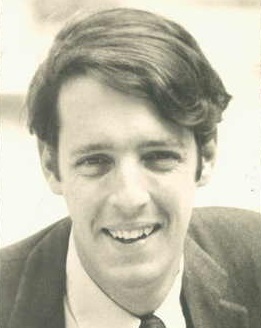Joe McGinniss facts for kids
Quick facts for kids
Joe McGinniss
|
|
|---|---|

McGinniss in 1969
|
|
| Born | December 9, 1942 New York City, U.S. |
| Died | March 10, 2014 (aged 71) Worcester, Massachusetts, U.S. |
| Occupation | Journalist, author |
| Language | English |
| Alma mater | College of the Holy Cross |
| Period | 1964–2014 |
| Genre | Nonfiction and novels |
| Subject | Richard Nixon Jeffrey R. MacDonald Sarah Palin Alaska Italian football |
| Notable works | The Selling of the President 1968 Fatal Vision Cruel Doubt Blind Faith Going to Extremes The Miracle of Castel di Sangro |
| Spouse | Nancy Doherty |
| Children | 5, including Joe Jr. |
Joseph Ralph McGinniss Sr. (December 9, 1942 – March 10, 2014) was an American writer. He wrote many non-fiction books and some novels.
He became well-known for his best-selling book, The Selling of the President 1968. This book looked at how Richard Nixon's presidential campaign was marketed. Joe McGinniss also wrote popular true crime books like Fatal Vision, Blind Faith, and Cruel Doubt. These books were later made into TV shows. His last book, The Rogue: Searching for the Real Sarah Palin, was about Sarah Palin, who used to be the governor of Alaska.
Contents
Early Life and Education
Joe McGinniss was born in Manhattan, New York City. He was the only child of Joseph A. McGinniss, a travel agent, and Mary, a secretary. He grew up in Forest Hills, Queens, and Rye, New York. When he was young, he chose his middle name, Ralph, after a famous baseball player named Ralph Kiner.
He went to Archbishop Stepinac High School in White Plains. In 1964, he graduated from the College of the Holy Cross in Worcester, Massachusetts. After college, he started working as a reporter for the Worcester Telegram. Later, he became a sportswriter for the Philadelphia Bulletin. He then joined The Philadelphia Inquirer as a general writer. In 1979, he became a writer-in-residence at the Los Angeles Herald Examiner.
From 1982 to 1985, Joe McGinniss taught creative writing at Bennington College in Vermont. Some of his students became famous writers themselves, like Donna Tartt and Bret Easton Ellis. People who knew him said he was a friendly person who helped other writers.
Writing Career Highlights
The Selling of the President
Joe McGinniss's first book, The Selling of the President 1968, became a huge success. He was only 26 years old when it appeared on The New York Times Best Seller list. This made him the youngest living writer to achieve that at the time. The book stayed on the best-seller list for 31 weeks.
The book explored how Richard Nixon's campaign was presented to voters during the 1968 presidential election. Many people praised the book. It is now seen as a classic example of how political campaigns are reported. Roger Ailes, who worked on Nixon's campaign, said that McGinniss "changed political writing forever."
After this book's success, McGinniss left his newspaper job to write books full-time. He wrote a novel called The Dream Team. He also wrote Heroes and Going to Extremes, which was about his year exploring Alaska.
The Last Brother
In 1993, Joe McGinniss published a book called The Last Brother: The Rise and Fall of Teddy Kennedy. This book was about Ted Kennedy, a well-known politician.
However, the book received a lot of criticism from many reviewers. Some critics said it lacked proper sources and had parts that were not well-supported. Despite the strong negative reviews, McGinniss suggested that the Kennedy family might have tried to make his book look bad. He said they often tried to influence journalists.
The sales of The Last Brother were not as good as expected.
The Rogue: Searching for the Real Sarah Palin
Joe McGinniss returned to Alaska in 2008 to research an article. This article was about then-Governor Sarah Palin and her plans for a natural gas pipeline. In 2009, he signed a contract to write a book about Palin. He went back to Alaska in 2010 to do more research.
He even rented a house next door to Palin's home in Wasilla. Palin wrote on her Facebook page about him being next door. This caused a brief stir in the media. McGinniss said there was no view into anyone's bedroom from his rental house. He suggested Palin could have just talked to him.
His book, The Rogue: Searching for the Real Sarah Palin, was published in September 2011. Some early reviews criticized the book for using unnamed sources.
Other Works
Joe McGinniss also wrote other interesting books. In 1999, he published The Miracle of Castel di Sangro. This book was highly praised. It followed an Italian soccer team from a small town during a dramatic season in the big leagues.
In 2004, he released The Big Horse. His next book, Never Enough (2007), explored another true story. It was about a difficult family situation involving a murder case in Hong Kong.
Later Life and Passing
Joe McGinniss's son, Joe McGinniss Jr., who is also a novelist, said that his father sometimes wasn't around much. However, he always encouraged his son's writing career.
In 2013, it was confirmed that Joe McGinniss had prostate cancer. He passed away on March 10, 2014, at the age of 71, in Worcester, Massachusetts.
A private memorial was held in New York in May 2014. Many people shared tributes and obituaries after his death. These were published in various newspapers and online.
See also
- Fatal Vision - 1984 television miniseries
- Blind Faith - 1990 television miniseries
- Cruel Doubt - 1992 television miniseries

